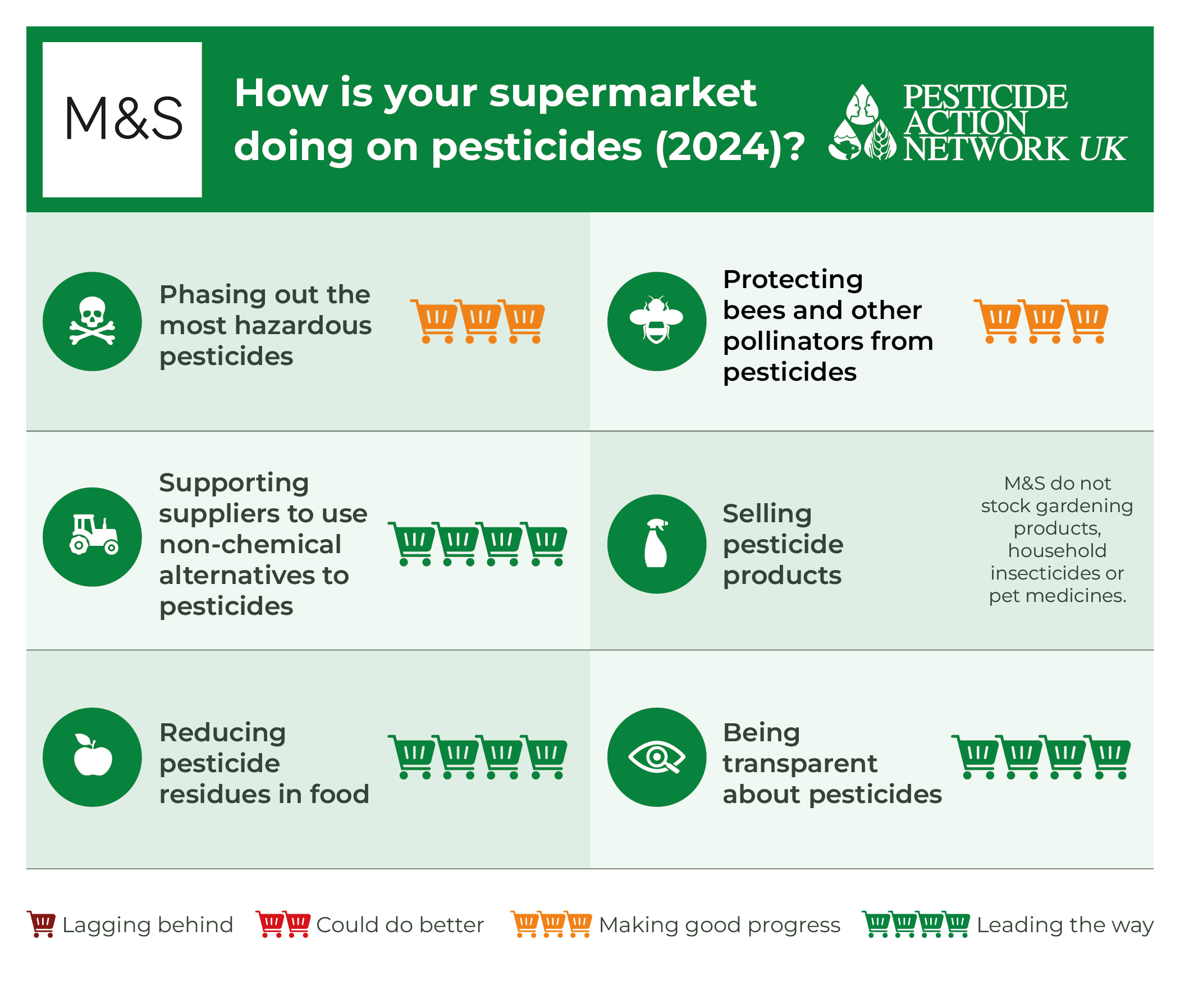Marks & Spencer
M&S received an excellent overall score and came joint first in the 2024 supermarket ranking. The company’s position has not changed since the previous ranking in 2021. While there is still more work to do, M&S continues to make great progress compared to the majority of other UK supermarkets in terms of protecting the health of consumers, agricultural workers and the environment from pesticides.

What is M&S doing well?
Phasing out Highly Hazardous Pesticides
- M&S has a strong focus on phasing out Highly Hazardous Pesticides. It has lists of pesticides which it bans, restricts or monitors within its global supply chains. The company uses extremely robust criteria for deciding which pesticides to add to its lists, which are more comprehensive than those used by most other supermarkets. In addition, while most supermarkets’ lists only apply to pesticides used to grow fruit and vegetables, M&S also applies its lists to frozen and prepared produce. This is particularly important given that M&S is well-known for its ready meals and sandwiches. In summer 2024, the company banned 14 additional Highly Hazardous Pesticides. It also flagged 32 pesticides on its restricted list as a priority for phase out. Suppliers wanting to use these flagged chemicals must provide M&S with a range of detailed information, including measures taken to prevent harms to human health and the environment and a plan for ending the use each specific pesticide within three years.
Protecting farmworkers from pesticides
- M&S has some good measures in place designed to protect agricultural workers applying pesticides that are known to harm human health. These include requiring their suppliers to ensure that agricultural workers can access medical facilities and are offered regular health checks. It has also created a number of channels which enable workers to raise issues related to human rights and health and safety directly with M&S, rather than having to risk their jobs by reporting these problems to their employer. M&S has also banned a number of pesticides which pose a high risk to worker health, including the lethal herbicide paraquat.
Supporting suppliers to use non-chemical alternatives to pesticides
- M&S provides excellent support to its suppliers to help them reduce their pesticide use and adopt non-chemical alternatives. For example, it conducts research into innovative, non-chemical pest control methods which it shares with its suppliers around the world and has established five “Indicator and Innovation Farms” across the UK trialling nature-friendly farming practices. It offers its UK suppliers bespoke advice, provides a range of training and guidance on pesticide reduction and runs peer-to-peer groups designed to bring its UK and EU suppliers together to discuss their experiences of using non-chemical alternatives to pesticides and share learnings. It has also set up a funding programme designed to support its international growers to reduce their use of the most toxic pesticides and trial and adopt non-chemical alternatives. Learnings from the programme will be shared with all of M&S’ suppliers, in order to drive change across the company’s global supply chains.
Reducing pesticide residues in food
- M&S tests a range of food types for pesticide residues including fruit, vegetables, herbs, spices, nuts and wheat products such as bread and pasta. When this testing detects a residue that reaches half of the legal safety limit, or when the residues of more than five different pesticides are found on one food item, an investigation is triggered. This includes working closely with the supplier to understand and tackle the problem, discussing the issue in its grower groups and sharing any learnings across the supply chain. When EU and UK safety limits diverge, M&S adopts the stronger of the two. This has become more important as UK safety limits increasingly move away from their EU equivalents.
Protecting bees and other pollinators from pesticides
- M&S is better than most other UK supermarkets at protecting bees and other pollinators from pesticides. It has restricted the use of neonicotinoids (insecticides notorious for driving declines in pollinator populations worldwide) which means that any grower wanting to use these chemicals must justify their request and seek explicit permission to go ahead. The company has also introduced an outright ban on the use of neonicotinoids on any crops that produce flowers attractive to bees. Many other pesticides that are ‘highly toxic to bees’ have also been added to M&S’ restricted list or prohibited from use entirely. It funds research on pollinator health and is the only UK supermarket that requires all of its UK growers to monitor at least one pollinator species on their farms.
Being transparent about pesticides
- M&S got full marks for transparency because it publishes its full pesticide policy, the results from its residue testing programme and the lists of which pesticides it has prioritised for phase out.
What are M&S’ priority areas for improvement?
Phasing out Highly Hazardous Pesticides
- M&S could be making more progress on phasing out the use of Highly Hazardous Pesticides in its supply chains. While the lists of pesticides it prohibits, restricts and monitors are comprehensive, they remained largely static between 2022 and mid-2024. Seven “Special Attention” pesticides which it flagged as a priority for phase out in 2021 have remained in use, albeit with some additional restrictions. However, in summer 2024, M&S implemented a raft of extremely positive changes aimed at speeding up its processes for phasing out pesticides. All supermarkets should be aiming for continuous improvement in terms of phasing out the most toxic pesticides and it is great to see M&S step up its efforts in this area.
- M&S uses a range of criteria to identify which pesticides to prioritise for phase out, including pesticides that the World Health Organization has deemed ‘Highly Hazardous’. However, one of the criteria used by the company is that the pesticide has a “… low level of usage across our supply base, making them easier targets to focus on and phase out”. In order to have the biggest impact in terms of reducing pesticide-related harms to human health and the environment, the company should change this approach to focus its efforts on the chemicals that are widely in use by its growers, and therefore causing the most harm.
Protecting farmworkers from pesticides
- Like all UK supermarkets, M&S could be doing more to monitor pesticide poisonings of farmworkers. While M&S does require suppliers to report any incidents of poisoning, it is not currently systematically monitoring pesticide poisonings throughout its global supply chains. As a result, gaining an understanding of the true extent of worker poisonings remains a challenge.
Supporting suppliers to use non-chemical alternatives to pesticides
- While M&S has established a funding programme to support its international growers in their efforts on pesticide reduction, it does not currently run grower groups aimed at international growers or provide them with direct, bespoke advice on pesticide reduction. The company should increase its international offering to match the wide range of support it currently provides to UK and EU suppliers. Given that many of the most toxic pesticides are banned in the UK and EU, supporting international growers is particularly important.
Protecting bees and other pollinators from pesticides
- M&S should place restrictions on all pesticides that are classified as ‘highly toxic to bees’, with the ultimate aim of phasing them out entirely across their global supply chains. It should also expand its efforts on bees and pollinators to be more international since, currently, the research funded by the company and support offered to suppliers to better protect pollinators is largely UK-focused. This is especially important given that many of the most bee-toxic pesticides (including neonicotinoids) are banned for use in the UK and EU.
- Pesticides are still sprayed around M&S stores and car parks. To help biodiversity flourish, the company should run trials of non-chemical alternatives with the ultimate aim of phasing out the use of pesticides around its stores.













